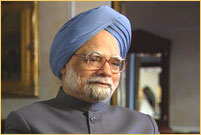MANMOHAN SINGH
Prime Minister
 Manmohan Singh, best known as ' father of Indian Reforms', has emerged as the Congress party's frontrunner, the 14th Prime Minister of India and also the first Sikh to have reached the country's top legislative position. Hailed to be the cleanest man in Indian politics, he was Former Finance Minister and author of the post-1991 economic reforms.
Manmohan Singh, best known as ' father of Indian Reforms', has emerged as the Congress party's frontrunner, the 14th Prime Minister of India and also the first Sikh to have reached the country's top legislative position. Hailed to be the cleanest man in Indian politics, he was Former Finance Minister and author of the post-1991 economic reforms.
Prime Minister
 Manmohan Singh, best known as ' father of Indian Reforms', has emerged as the Congress party's frontrunner, the 14th Prime Minister of India and also the first Sikh to have reached the country's top legislative position. Hailed to be the cleanest man in Indian politics, he was Former Finance Minister and author of the post-1991 economic reforms.
Manmohan Singh, best known as ' father of Indian Reforms', has emerged as the Congress party's frontrunner, the 14th Prime Minister of India and also the first Sikh to have reached the country's top legislative position. Hailed to be the cleanest man in Indian politics, he was Former Finance Minister and author of the post-1991 economic reforms. He was Born to Mr Gurmukh Singh and Mrs Amrit Kaur on September 26, 1932 in a small village Gah (West Punjab), now in Pakistan. A brilliant student, Manmohan Singh secured top marks in almost all the major examinations he wrote. After his Masters in Economics from Amritsar's Hindu College under Punjab University he won scholarships to Cambridge and Oxford, earning a doctorate with a thesis on the critical role of exports and free trade in India's economy. Manmohan Singh won the prestigious Adam Smith prize in 1956 from Cambridge University.
The following year, he returned to India as a university lecturer and for the next nine years remained at Punjab University before being posted for international duty with UNCTAD (United Nations Conference on Trade and Development). He then joined the Delhi School of Economics as a professor. Two years later, his academic career was cut short and he joined the government to serve in various capacities.
Singh held several positions throughout the 1980s and early 1990s. He served as Economic advisor to the finance ministry in the late 70s, Deputy Chairman of Planning Commission and Chairman of University Grants Commission in 1980s and early 1990's and as the Governor of the Reserve Bank of India from 1982 to 1985 etc.
An academician, he was discovered by former prime minister Shri. P.V Narasimha Rao. Rao offered him the finance ministry in 1991 under the Congress Government, and the chance to rescue a sickly economy threatened by an acute balance of payments crisis. During his stint as the finance minister (1991-1996), the suave, soft-spoken Sikh guided India out of financial trouble and put the country on course to becoming an economic power by opening up the economy to foreign investment and slashing trade barriers.
Singh was always an unlikely politician, who was routed in a parliamentary election in 1999. In fact, he has never won an election and sits in the upper house. Politically, Manmohan Singh is the classic example of the stateless politician.
After the Indian National Congress won the 2009 general elections, Singh was reappointed as the Prime Minister of India on May 22, 2009, making him the first Indian Prime Minister since Jawaharlal Nehru to return to power after completing a full five-year term before this over 40 years ago.
No comments:
Post a Comment